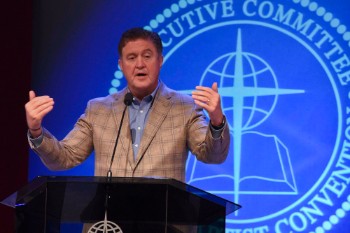
Southern Baptist Convention President Steve Gaines exhorted pastors and laity to pray, love the lost and spread the Gospel during his Sept. 18 address at the SBC Executive Committee meeting in Nashville. Photo by Morris Abernathy
NASHVILLE–Prayer and evangelism will enable the Southern Baptist Convention to abide and continue its work in an increasingly eclectic society, SBC President Steve Gaines told the Executive Committee during its 2017 fall meeting in Nashville.
SBC leaders and laity must see and love the lost so much that it creates a burden that the lost be saved, Gaines said in his address Sept. 18 at the SBC Building. He exhorted the Executive Committee, other Southern Baptist leaders and SBC employees gathered before him, to understand and love the disadvantaged, and to show them the love of Christ.
“I want to tell you this,” said Gaines, pastor of Memphis-area Bellevue Baptist Church in Cordova, Tenn. “The future of the Southern Baptist Convention depends on whether or not we will prioritize prayer and evangelism. I don’t care where you are on the theological spectrum, if you don’t believe in prayer and evangelism, there’s no hope.
“We’ve got to embrace it.”
Gaines anchored his address in Paul’s ministry in Athens highlighted in Acts 17:16-33, briefly shared his personal testimony of repentance, and referenced the familiar sermon of the beloved late pastor E.V. Hill on “Why I Don’t Want to Go to Hell.”
“Do you see the fact, and do you sense the fact, that lost people are really going to hell, and they’re not getting out?” asked Gaines, as he shared descriptions of hell from Hill’s famous sermon. “Do you sense lostness like that? Do you see lostness?”
When Paul entered Athens, Gaines noted, he was repulsed by the idolatry he encountered. He saw the lostness in the city. He sensed it. He called it out, and he shared the only gospel capable of overcoming lostness. Like Paul, and like Jesus who gave Paul the heart and the eyes to see and sense lostness, Southern Baptists must be bold and share the gospel to save the lost, Gaines said.
“I don’t care how many degrees you have; you could have as many degrees as a thermometer,” he said. “You have not preached the gospel if you don’t give people a chance to respond to it, then and there.”
Gaines also exhorted Southern Baptists to understand the downtrodden and to show compassion to those who didn’t grow up under the nurturing environment others might have enjoyed.
“Do you see someone and you say, ah, ‘would you just get a job?’ Or do you see a little boy who’s growing up in some very difficult times?’“ asked Gaines, as he told a hypothetical story drawn from true societal ills. Unlike others, he noted, this child often went to school hungry and dirty, and had no one to help him with homework when he returned home at the end of the school day.
“He didn’t have any books at home like some of the other children, and he couldn’t learn to read. And because he couldn’t learn to read, he couldn’t really process in school,” Gaines said. “And so he drops out, he gets in a gang, and all of a sudden, we see somebody, and we say, ah ‘If he’d just get a job.’
“I’ve got news for you; God sees him differently than that,” Gaines said.
Remembering personal stories of repentance, coupled with the personal sadness of being lost, could help Southern Baptists prioritize sharing the Gospel and praying for the salvation of lost souls, Gaines said.
“If somebody hadn’t seen my lostness, sensed my lostness, and shared with me how I could be saved, I wouldn’t be standing up here,” Gaines said. “I know that I’d be divorced. I know that I would be a drunkard. I know that I would have lived a life cursing people, hating people. I would have been a racist.”
Gaines led listeners in praying that God would enable them to see, love and evangelize the lost, and closed his sermon by invoking the familiar hymn, “Love Lifted Me.”
“But I was sinking deep in sin; I was far from the peaceful shore. Very deeply I was stained within, I was sinking to rise no more,” Gaines said of himself. “But the master of the sea, heard my despairing cry, and from those waters—I’ve been in those waters—He lifted me.
“Now safe am I.” (BP)
Diana Chandler